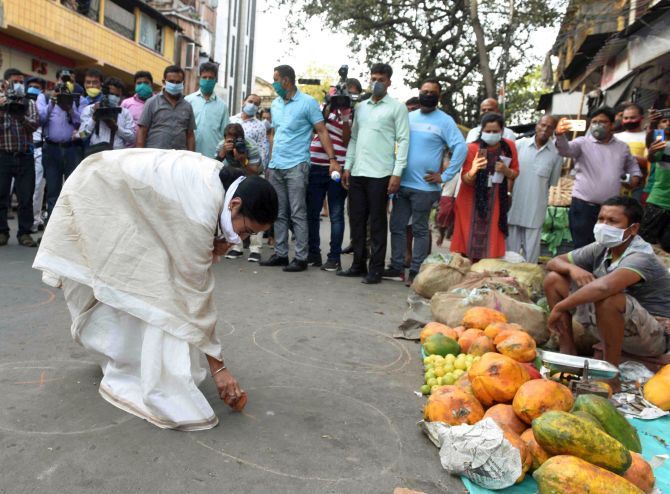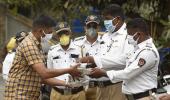'At this point of time, West Bengal is doing better than other states in tackling the crisis. We have a chief minister who herself has hit the streets to do what is to be done, and at the same time ensuring a proper lockdown. She is also trying day and night to set up the requisite infrastructure.'
Namrata Acharya and Arup Roychoudhury report.

West Bengal Chief Minister Mamata Banerjee on Thursday did not attend the videoconference meeting of Prime Minister Narendra Modi with her equivalents in various states.
If sources in the state government are to be believed, it was because the Centre has not cleared West Bengal’s dues and also because Banerjee thinks the PM should have acted on the Covid-19 pandemic sooner.
Two letters Banerjee wrote Modi in March have been publicised.
In one she requested him to stop incoming international flights to Kolkata, just before he announced a nationwide 21-day lockdown, and in another, earlier this week, she sought Rs 25,000 crore as financial assistance in tackling the pandemic, and clearing dues worth Rs 36,000 crore.
But beyond these reports, what is being acknowledged in the state is that Banerjee had ordered a shutdown in Kolkata and parts of West Bengal on March 22, effective March 23, before the nationwide shutdown, and migrant workers from the state were not forced into the kind of mass migration that those from Uttar Pradesh and Bihar had to go through.
Around two and a half weeks ago, when West Bengal had just three confirmed Covid-19 cases, Banerjee held a three-hour meeting.
“The meeting was not with only the health department but also with private hospitals and doctors. The research that was happening across the world was brought to her attention, and also the escalating situation in Italy and other parts of Europe,” a senior minister in her government told Business Standard.
“Therefore, she had full knowledge from the doctors, hospitals, the health department's own ground-level assessment, as well as the research and projections that were being made worldwide. It was then decided to lock down parts of the state,” the minister said.
Officials say this early decision on the lockdown saved a degree of trouble for some migrants.
West Bengal has a huge pool of workers who have migrated to states like Kerala, Tamil Nadu, Delhi, and Maharashtra.
When the state lockdown was announced, migrant workers’ families told them to head back home. And a number of them managed to, while trains were still running.
However, it should be noted that Banerjee had also called for ceasing passenger train operations even as migrant workers were returning home.
A large number of such migrant workers are still stuck in other states.
According to Rajiv Sinha, chief secretary, West Bengal, close to 282,000 workers from West Bengal are yet to return.
The West Bengal government is in touch with its counterparts in those states.

Meanwhile, the state is also taking care of nearly 40,000 people stuck in West Bengal from other states, he said.
“At this point of time, West Bengal is doing better than other states in tackling the crisis. We have a chief minister who herself has hit the streets to do what is to be done, and at the same time ensuring a proper lockdown. She is also trying day and night to set up the requisite infrastructure,” said Arindam Biswas, consultant, department of general medicine in a private hospital.
Biswas said there was need for more quarantine centres and the next two weeks could be crucial as the health of the migrant workers required monitoring.
Banerjee did some other things before the central government.
She announced a scheme called “Prochesta”, under which each daily wage worker would get an assistance of Rs 1,000 per month from the government, before the Centre’s handout schemes.
Before Union Finance Minister Nirmala Sitharaman announced a Rs 50 lakh insurance cover for frontline healthcare workers, the state government gave an insurance cover of Rs 5 lakh for people working in healthcare.
This week West Bengal announced the setting up a nodal coronavirus hospital in each of the state’s 22 districts.
She also increased the insurance cover to Rs 10 lakh, and it will be extended to those who have been aiding the government in the fight against the pandemic.
They include healthcare professionals, sanitation workers, and police personnel.
Every day Banerjee can be seen on social media, taking rounds of hospitals, mandis, and police establishments to take stock of the situation, educating people on social distancing.
Experts say West Bengal’s early measures to control coronavirus might help the state to keep the numbers of the affected lower than those in other states.
Politicians are already talking about a Bengal model in tackling the present crisis.
Santanu Sen, a doctor and a Rajya Sabha member of the Trinamool Congress, said: “Bengal is emerging as a role model in tackling this crisis. No other CM has gone on streets at this time. Also in each district, the CM has identified hospitals for corona. At the same time, she is ensuring no one is deprived of food.”
Whether West Bengal emerges as a role model or not in tackling the corona crisis is yet to be seen, but surely it is ahead of the curve in containing it.











